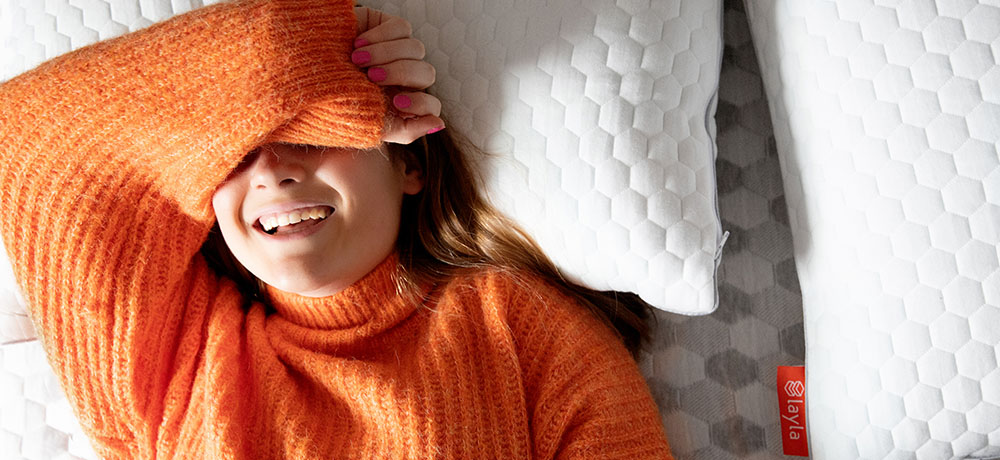Sleeping with the wrong sheets can trap body heat, raise your core temperature, and keep you uncomfortable while trying and catching some shuteye. Fortunately, numerous types of bed sheets offer cooling properties. To help you get started, we rounded up a list of the four best sheet materials for hot sleepers. Read through to learn about the different sheets for hot sleepers, or use the link list below to jump to a sheet material of your choice.
- What Are Cooling Sheets?
- What Are the Best Materials for Cooling Sheets?
- Other Considerations When Buying Cooling Sheets
- Wrapping Up
What Are Cooling Sheets?
Cooling sheets are fairly explanatory—they’re bed sheets that keep you cool at night. Most ordinary, run-of-the-mill sheets are constructed in a way that traps body heat and keeps you warm at night. While this might sound nice during those cold winter months, if you naturally run hot or live in an area that’s warm all year long, traditional sheets won’t serve you well.
Aside from keeping you cool and comfortable at night, cooling sheets offer other benefits as well. For example, if you’re considering sleeping with an air conditioner on, you might want to think again. Some research has found that sleeping with the AC on, even on a low setting, can negatively impact your sleep quality. On the other hand, cooling sheets can help regulate your body’s temperature without disrupting your sleep cycles. Additionally, some cooling sheets can also wick moisture, prevent midnight sweats, and even offer cooling and warming properties, allowing you to use them during every season.
What Are the Best Materials for Cooling Sheets?
There are various types of cooling sheets on the market today, each constructed from different materials that offer their own benefits and drawbacks. As you begin your search for the best sheet material for hot sleepers, start with this list of different types of materials used in cooling sheets. This way, you can narrow your choices before searching in-store or online. Here’s our list of the four best cooling sheets for hot sleepers:
Cotton Cooling Sheets
One of the most popular fabrics in the world is cotton. Cotton comes from natural cotton plants, and once harvested, it’s spun into yarn and used in various products, such as the clothes we wear or the towels we dry off with. And if you have difficulty staying asleep, cotton sheets can help. Below are some pros and cons of cotton sheets:
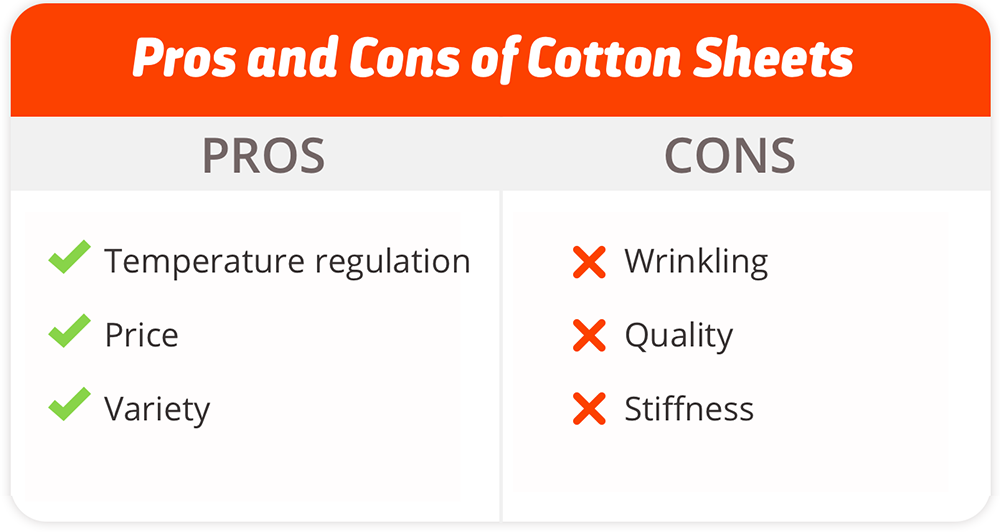
Pros of Cotton Sheets
- Temperature regulation: Cotton can naturally regulate temperature, meaning you’ll stay cool in warmer months and warm in cooler months.
- Price: Cotton is one of the most affordable bedding materials and is available for every budget, size, and style.
- Variety: There are various types of cotton you can choose from, such as flannel, sateen, and velvet. When it comes to bed sheets, the coolest types of cotton include percale and Egyptian cotton.
Cons of Cotton Sheets
- Wrinkling: If you want your bed to be perfectly made every morning, you might want to skip cotton. Cotton is prone to wrinkling, which can throw off the well-kept vibe you’re looking for.
- Quality: Over time, cotton can deteriorate quickly, especially if the cotton sheets you choose are made with cheaper cotton, resulting in tears and thinning.
- Stiffness: From the start, cotton sheets might not be the most comfortable. It usually takes some time for cotton sheets to break in and feel cozy.
Bamboo Cooling Sheets
Over the last few years, bamboo has made a name for itself. One of the reasons why bamboo is becoming a popular fabric material, according to the Sleep Foundation, is because they’re durable and environmentally friendly. When it comes to bamboo vs. cotton sheets, bamboo uses 200x less water, can grow in various soils, and only the grass is harvested, meaning the roots stay in place so the bamboo can regrow stronger. In addition to its environmentally-friendliness, here are some other pros to look out for, along with some cons of bamboo sheets worth noting:
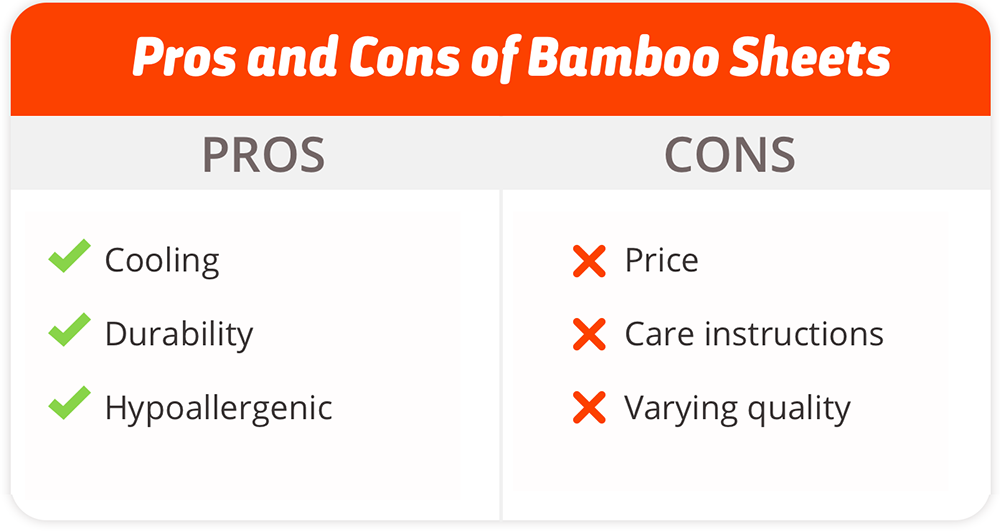
Pros of Bamboo Sheets
- Cooling: Bamboo is an extremely breathable fabric, allowing heat to escape while you sleep. Additionally, bamboo sheets sleep about 3-degrees cooler than cotton sheets and can wick away moisture and resist odor.
- Durability: Of all the different types of sheets for hot sleepers, bamboo might be one of the most durable. On average, bamboo sheets can last up to 1,000 cycles in the wash. And unlike cotton, bamboo sheets get softer the more they’re used, so their sheen lasts longer.
- Hypoallergenic: While only some organic cotton sheets are hypoallergenic, all bamboo sheets are hypoallergenic, meaning dust mites and other allergens won’t keep you up during the night.
Cons of Bamboo Sheets
- Price: Bamboo sheets tend to have a higher sticker price than some other sheet materials. However, with this price comes more durability, meaning you won’t have to replace them as often.
- Care instructions: Fabrics like cotton are relatively easy to care for. When it comes to bamboo sheets, you’ll need to pay a little more attention to their care, such as washing them on cold and drying them cool without using any bleach or fabric softeners.
- Varying quality: Depending on the bamboo sheets you buy, you might notice a large gap in quality. Cheaper bamboo sheets might contain added chemicals that can be harmful to you and the planet. Layla Sleep’s cooling bamboo sheets are made from 100% viscose from bamboo.
Microfiber Cooling Sheets
Microfiber, also known as polyester microfiber or sometimes nylon, is a synthetic material that’s become popular over the years due to its affordability and versatility. Here are some of microfiber’s advantages and disadvantages:
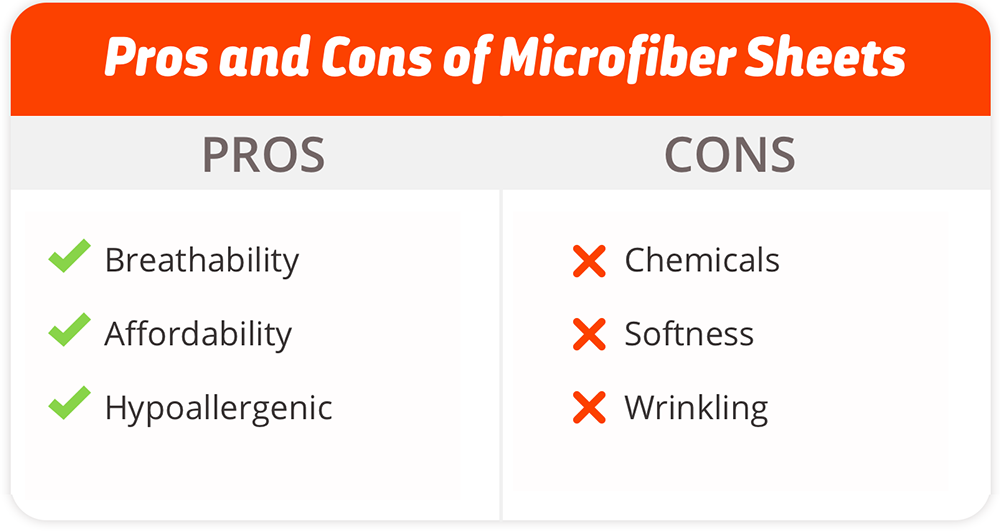
Pros of Microfiber Sheets
- Breathability: One of the main draws of microfiber is its breathability. At night, body heat can easily escape through microfiber sheets, so you can stay cool throughout the night.
- Affordability: The top reason why many consumers flock to microfiber sheets is their affordability. Of all the materials, microfiber sheets are often the least expensive.
- Hypoallergenic: Similar to bamboo sheets, microfiber sheets are hypoallergenic since they’re constructed with synthetic materials.
Cons of Microfiber Sheets
- Chemicals: Unlike natural sheets like cotton and bamboo, microfiber sheets are constructed from petroleum waste products and other chemicals.
- Softness: Compared to cotton and bamboo sheets, microfiber sheets are not as soft, which can be noticeable if you’re shifting from a more organic material type.
- Wrinkling: Similar to cotton sheets, microfiber sheets are prone to wrinkling and wear down over time, meaning you’ll need to buy more, more often. They can also be very static, which can be uncomfortable when getting in and out of bed at night or in the morning.
Tencel Cooling Sheets
Tencel sheets use either lyocell, rayon, or modal, which are different types of wood pulp. Tencel is made by dissolving wood pulp, straining it, and spinning the fibers into a yarn. Take a look at some of the benefits and drawbacks of Tencel sheets:
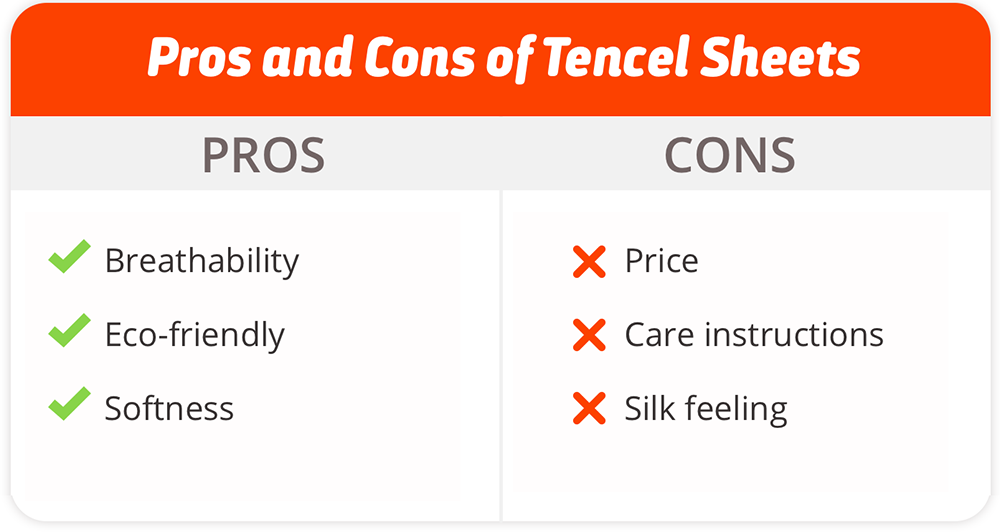
Pros of Tencel Sheets
- Breathability: Tencel sheets are extremely breathable and thermal regulating, which can help keep your body cool during the night, and are also great at absorbing moisture.
- Eco-friendly: Most Tencel sheets are eco-friendly, similar to bamboo sheets, meaning you don’t have to lie awake at night worrying about the environmental impact of your bedding.
- Softness: Tencel has a feeling much similar to silk, meaning they’re soft to the touch and smooth on the skin.
Cons of Tencel Sheets
- Price: Because of the rigorous process of creating Tencel, Tencel sheets often come with a high sticker price compared to the other sheet materials on this list.
- Care instructions: Tencel sheets can be delicate when it comes to washing, and they often can’t withstand warm temperatures when laundering.
- Silk feeling: For some sleepers, the soft, waxy feeling of silk might not be the most comfortable compared to other types of materials.
Other Considerations When Buying Cooling Sheets
The type of material used in the sheets you buy isn’t the only factor to consider when searching for cooling sheets. In addition to materials, consider these features:
- Thread count: The thread count of your sheets can determine whether they’ll keep you cool at night or not. In general, sheets with a thread count between 250 and 300 are ideal for sleeping cool.
- Breathability: One of the most important factors when choosing sheets for hot sleepers is how breathable they are. The thread count of your sheets will impact the breathability, along with the weave and type of fabric.
- Moisture-wicking: Some types of bed sheets, such as bamboo sheets and Tencel sheets, have moisture-wicking capabilities, which can draw heat away from your body at night to keep you cool.
- Price: Some cooling bed sheet materials are more expensive than others, which is a factor you might need to consider when purchasing sheets. However, in general, the more expensive a sheet, the longer it will last.
Wrapping Up
The best temperature for sleep is 65 degrees Fahrenheit. If you’re having trouble finding a comfortable temperature, whether it’s because you live in a warmer climate or tend to sleep hot, cooling sheets might be your answer. With this list of the best sheet material for hot sleepers, you’ll be able to narrow down your choices, so you can get the quality sleep you deserve.


